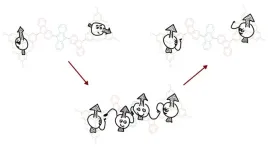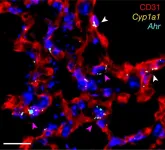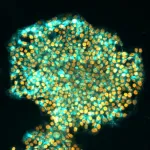Recent developments include a novel single-cell sequencing technology that allows for rapid analyses of archived and frozen cells, greater understanding of the role of long noncoding RNAs in glioblastoma treatment resistance, a series of studies leveraging a large standardized proteogenomic dataset including over 1,000 tumors across 10 cancer types, a therapeutic alternative to reduce cardiotoxicity and improve immunotherapy responses in melanoma, long-term follow-up data on neoadjuvant immunotherapy for cutaneous squamous cell carcinoma, and molecular insights into the effects of smoking exposure on patients with an aggressive subtype of acute myeloid leukemia.
Read this press release in the MD Anderson Newsroom.
Researchers develop high-throughput technology for analyzing FFPE samples
Ductal carcinoma in situ (DCIS) is a known precursor of breast cancer, but genomic understanding of disease progression and recurrence has been limited by the inability to apply single-cell sequencing to formalin-fixed paraffin-embedded (FFPE) samples that have been archived over many years. Researchers led by Nicholas Navin, Ph.D., developed a novel high-throughput single-cell DNA-sequencing method compatible with FFPE samples to profile genomic copy number variations. This technology – named Arc-well – reliably profiled thousands of cells from 27 FFPE samples, including some archived for over 30 years, and significantly shortened sample processing time. The researchers were able to track genomic changes in matched samples from premalignancy to invasive recurrence, showing they were genetically related. Arc-well has broad potential applications for studying existing collections of FFPE and frozen samples to provide further insights into copy number diversity in various cancers and in normal tissues. Learn more in Cell.
Targeting long noncoding RNAs may help overcome treatment resistance in glioblastoma
Glioblastoma (GBM) stem cell-like cells (GSCs) are critical for tumor development and therapeutic resistance, but researchers do not fully understand the molecular pathways that can lead to treatment resistance. Long noncoding RNAs (lncRNAs), which regulate gene expression, can have tumor-promoting effects, but it is unclear if they play a role in GSCs to drive treatment resistance. Researchers led by Yiwen Chen, Ph.D., used CRISPR interference along with multi-omic analysis of The Cancer Genome Atlas to identify a post-transcriptional role for lncRNAs in promoting GSC proliferation and tumorigenesis as well as enhancing treatment resistance. They discovered lncRNAs regulate specific DNA damage repair pathways that allow GSCs to survive double-strand breaks caused by radiation therapy. The findings suggest that inhibiting this lncRNA-mediated process could sensitize GSCs to treatment with radiation or homologous recombination deficiency targeted therapy, meriting further research as a potential therapeutic strategy. Learn more in Science Advances.
Pan-cancer studies on NCI proteogenomic dataset provide insights into cancer
The National Cancer Institute (NCI) has released a comprehensive pan-cancer dataset with standardized genomic, proteomic, imaging and clinical data from individual studies covering more than 1,000 tumors across 10 cancer types. The Clinical Proteomic Tumor Analysis Consortium (CPTAC) published a series of papers in Cell and Cancer Cell describing their methods as well as initial discoveries in post-translational modifications, oncogenic driver mutations and DNA methylation patterns. These studies are the first to leverage this dataset and highlight the importance of team science to advance the proteogenomic understanding of cancer. As part of this team, Alexander Lazar, M.D., Ph.D., and colleagues integrated 2,755 histopathological images with detailed genomic and proteomic data to train machine learning models to correctly identify tumor versus normal tissue as well as tissue of origin, which is routine for pathologists, and to accomplish the more challenging task of predicting mutational status. Pathologist review of the latter revealed potential morphological cues that could supplement current classification systems. Additionally, the researchers developed a cloud-based user interface that allows clinicians to upload their own images for analysis. Learn more in Cell Reports Medicine.
Inhibiting mPGES-1 may reduce collagen and boost immunotherapy responses in melanoma
Collagen, a major component of the extracellular matrix, can influence a tumor's microenvironment and make it harder for the immune system to reach the cancer cells. This can also lead to treatment resistance and disease progression in certain patients with melanoma. A collagen-related proinflammatory protein called COX-2 has been studied, but COX-2 inhibitors may increase the risk of heart issues. Hoping to minimize cardiotoxicity, researchers led by Suhendan Ekmekcioglu, Ph.D., investigated prostaglandin E2 (mPGES-1), which is downstream of COX-2 and is associated with low T cell infiltration and poor outcomes. The researchers generated lab models of melanoma without mPGES-1 and found that tumors had reduced collagen and fewer exhausted T cells. Additionally, inhibiting mPGES-1 improved immunotherapy treatment response in a similar manner to COX-2 inhibitors. This suggests mPGES-1 inhibition could be a safer way to enhance immunotherapy treatments by reducing collagen and boosting immune response. Learn more in Cancer Research Communications.
Data continues to signal benefits of neoadjuvant immunotherapy in cutaneous squamous cell carcinoma
Long-term data continue to provide strong evidence of the effectiveness of neoadjuvant immunotherapy in patients with advanced, resectable cutaneous squamous cell carcinoma (CSCC) of the head and neck. Starting in 2017, the success of neoadjuvant immunotherapy in patients with unresectable CSCC prompted an investigator-initiated pilot study in patients with resectable disease. Preliminary data, published in Clinical Cancer Research, signaled strong and durable responses (55% pathologic complete response, and 20% major pathologic response), which were confirmed by a multi-center trial published in the New England Journal of Medicine. New long-term follow-up data from the team led by Neil Gross, M.D., originally presented at ASCO 2022, showed that none of the patients who had a pathologic response experienced a disease recurrence at a median follow-up of 42.3 months. These findings have supported the development of a registrational-intent, practice-defining randomized Phase III trial planned for early 2024. Learn more in JAMA Otolaryngology Head and Neck Surgery.
Preclinical study recommends smoking cessation for FLT3-mutant AML, highlights molecular pathways of disease progression
Past and current tobacco smoking is associated with poorer outcomes in patients with acute myeloid leukemia (AML) compared with non-smokers, but little is known about its impact on AML patients with aggressive FLT3-ITD mutations. Researchers led by Joya Chandra, Ph.D., mimicked cigarette exposure in lab models of FLT3-mutant AML to identify molecular pathways involved in leukemia progression and chemotherapy resistance attributable to cigarette smoke. Following smoke exposure, researchers discovered hypomethylation of GATA-2 as a poor prognostic indicator for AML in their models. Eliminating smoke exposure slowed tumor growth and reduced tumor burden compared to models with continued exposure, highlighting potential “go” and “no-go” signals to FLT3-mutant AML. Further examination uncovered novel protein changes and epigenetic regulators of aggressive disease. These findings suggest smoking cessation recommendations are merited for patients with FLT3-mutant AML and provide novel insights into molecular drivers of disease progression in patients with histories of smoking. Learn more in Blood Advances.
In case you missed it
Read below to catch up on recent MD Anderson press releases.
University of Texas System Regents announce plans to build UT Medical Center on site of Erwin Center MD Anderson names Christopher Flowers, M.D., Division Head of Cancer Medicine
– 30 –
END


